The #1 Fiber Optic Cabling
Say goodbye to downtime and hello to uninterrupted connectivity!
Network Cabling, is a leading provider of fiber optic cabling solutions with a reputation for excellence in the industry. We have served countless clients across various industries. Our mission is to empower businesses with the fastest and most reliable network connections.
Request a FREE Quote!Call now:(760) 300-3260
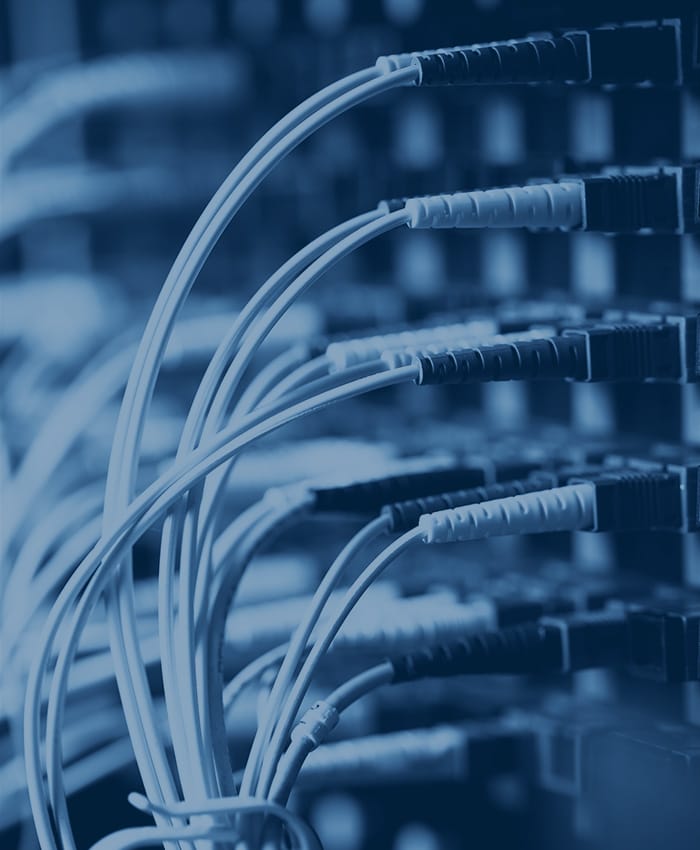
Fiber Optic Cabling
At Network Cabling, we take pride in our meticulous fiber optic cabling process that ensures the best performance for your network. Our commitment to delivering exceptional customer service and experience starts right from the initial consultation to the final installation. Here's a detailed look at our fiber optic cabling process:
- Consultation and Assessment:
Our journey begins with understanding your unique network requirements. We schedule an in-depth consultation where our experts will listen to your needs and assess your space. This step allows us to tailor a solution that fits your specific demands. - Design and Planning:
After a thorough assessment, our skilled engineers design a customized fiber optic cabling plan for your network. We take into consideration factors like network size, data transfer speeds, and future scalability to ensure optimal performance. - Cable Selection and Procurement:
Choosing the right fiber optic cables is crucial for network efficiency. We source only the highest-quality cables that meet industry standards. Our selection includes single-mode and multi-mode cables, each suited to different network requirements. - Pre-installation Site Preparation:
Before the actual installation begins, we ensure that your space is prepared for the cabling process. This involves clearing any obstacles and creating a safe environment for our technicians to work in.
- Installation:
Our highly trained technicians carry out the installation process with precision and care. We use state-of-the-art equipment to lay the cables efficiently and minimize any disruption to your daily operations. - Testing and Quality Assurance:
Once the installation is complete, we rigorously test the entire network to ensure that it meets our stringent quality standards. This step involves checking for signal strength, data loss, and overall network performance. - Documentation:
We provide comprehensive documentation of your fiber optic cabling setup, including schematics, cable routes, and test results. This documentation is essential for future maintenance and troubleshooting. - Training and Handover:
To ensure you can make the most of your new fiber optic network, we offer training sessions to your staff. We'll guide them on best practices and how to handle routine maintenance tasks. - Ongoing Support:
Our commitment to excellent customer service doesn't end with the installation. We offer round-the-clock support and maintenance services to address any issues and ensure your network runs smoothly.
We are proud to have a team of highly skilled professionals who are passionate about what they do. Our commitment to innovation, quality, and customer satisfaction has made us a trusted partner for businesses seeking top-tier network solutions.
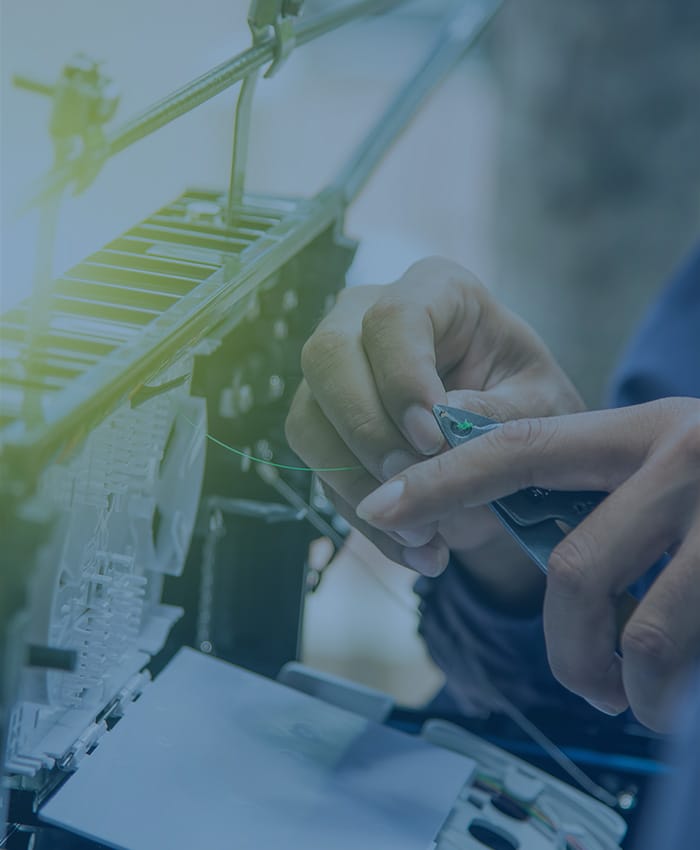
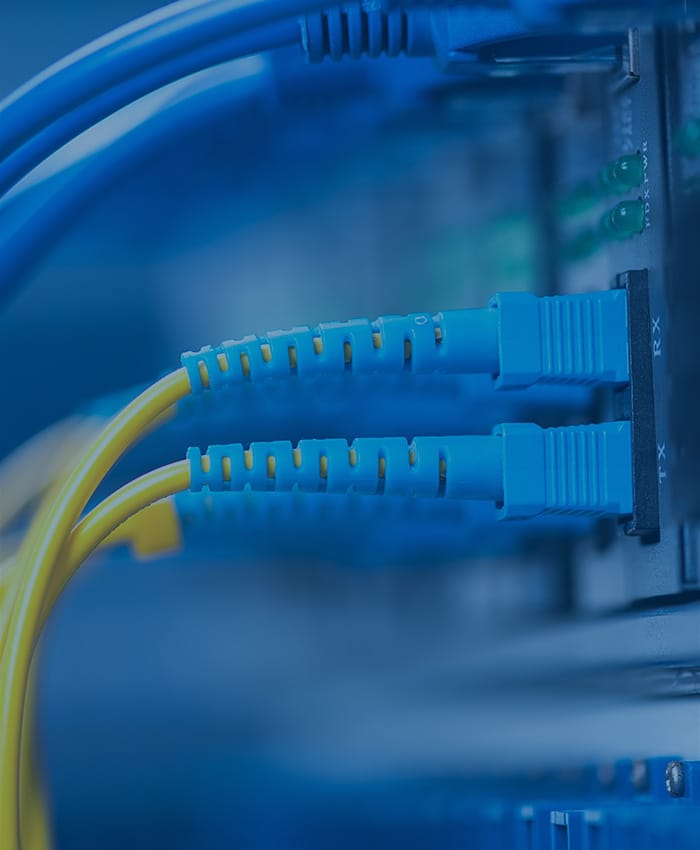
Fiber Optic integration
We believe in the power of technology to transform businesses, and our mission is to empower organizations with robust and efficient cabling infrastructures. Our team of dedicated professionals brings a wealth of experience and expertise to every project, ensuring that your network supports your growth and innovation.
- Expertise and Experience:
With years of experience in the industry, we have a proven track record of delivering top-notch fiber optic cabling solutions. Our team of experts is well-versed in the latest technologies and industry best practices. - Cutting-Edge Technology:
We stay at the forefront of technological advancements in fiber optics. This allows us to provide you with the most advanced and efficient cabling solutions for your network. - Customized Solutions:
We understand that every network is unique. Our solutions are tailored to your specific requirements, ensuring that you get the best performance and value for your investment. - Reliability and Performance:
Our commitment to quality and rigorous testing guarantees a reliable and high-performing network. You can trust us to deliver a solution that exceeds your expectations. - Exceptional Customer Service:
At Network Cabling, customer satisfaction is our priority. We provide dedicated support and quick response times to address any issues or concerns you may have. - Competitive Pricing:
Our pricing is competitive without compromising on quality. We offer transparent pricing structures, so you know exactly what you're paying for.
Fiber Optic Cabling
Our fiber optic cabling services can benefit a wide range of businesses and organizations across various industries. Here's a list of businesses and entities that can take advantage of our services:
- Corporate Offices:
Large corporations and businesses with extensive networking needs can benefit from the high-speed and reliable connectivity offered by fiber optic cabling. - Data Centers:
Data centers require robust and scalable network infrastructure to manage and transmit vast amounts of data efficiently. - Educational Institutions:
Schools, colleges, and universities need fast and reliable networks to support online learning, research, and administrative functions. - Hospitals and Healthcare Facilities:
The healthcare industry relies on secure and high-speed data transfer for patient records, telemedicine, and medical imaging. - Financial Institutions:
Banks and financial institutions require secure and low-latency networks for transactions, data storage, and communication. - Government Agencies:
Government entities need secure and efficient networks for data sharing, communication, and public services. - Manufacturing Companies:
Manufacturers depend on networks for automation, inventory control, and quality assurance processes. - Media and Entertainment:
Broadcasting companies, studios, and content providers require fast and reliable networks for content creation and distribution. - Retail Stores:
Retailers benefit from fiber optic networks for point-of-sale systems, inventory management, and customer Wi-Fi.
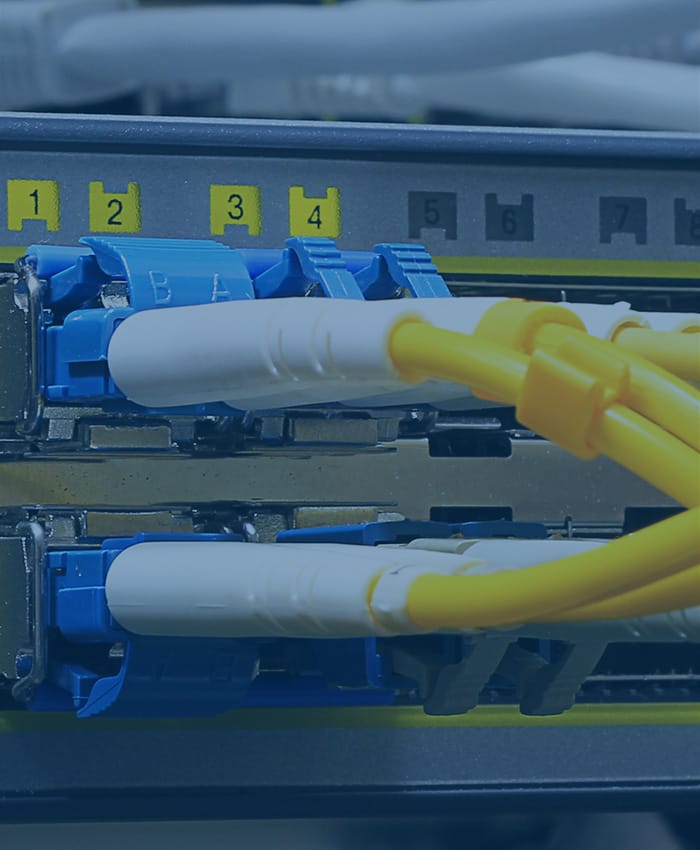
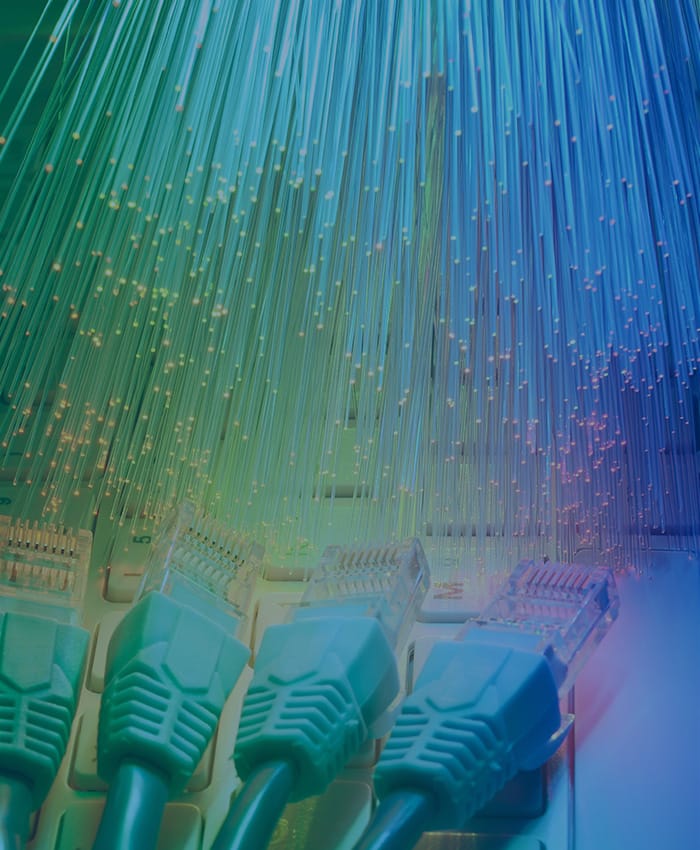
- Telecommunication Companies:
Telecom providers use fiber optic cabling as the backbone of their networks to deliver high-speed internet and telecommunications services. - Transportation and Logistics:
Shipping companies and logistics providers use networks for tracking and managing shipments and inventory. - Energy and Utilities:
Utilities and energy companies require robust networks for monitoring and managing infrastructure, such as power grids and pipelines. - Small and Medium-sized Businesses (SMBs):
SMBs can benefit from fiber optic cabling to improve their online presence, communication, and data storage capabilities. - Non-Profit Organizations:
Non-profits can use fast and reliable networks to support their operations, outreach, and fundraising efforts. - Residential Communities:
Housing complexes and residential areas can provide high-speed internet to residents through fiber optic networks. - Event Venues:
Conference centers, stadiums, and event venues require robust networks for live streaming, ticketing, and attendee services. - Security and Surveillance:
Security companies and surveillance systems rely on fiber optics for transmitting high-definition video feeds and data. - Gaming and Esports:
The gaming industry benefits from low-latency networks for online gaming, streaming, and esports events. - Research and Development:
Research institutions and laboratories depend on high-speed networks for data analysis, collaboration, and experimentation.
In conclusion, when you choose Network Cabling, you're not just selecting a fiber optic cabling provider; you're choosing a partner dedicated to enhancing your network's performance and your overall satisfaction. Contact us today to discuss your network cabling needs and experience the Network Cabling difference firsthand. Your network deserves nothing but the best, and that's exactly what we deliver.
Fiber Optic Cabling FAQs
What is fiber optic cabling?
Fiber optic cabling is a technology that uses thin strands of glass or plastic (fibers) to transmit data using light signals. It is known for its high-speed data transmission capabilities.
How does fiber optic cabling work?
Fiber optic cables transmit data as pulses of light. The light signals bounce off the internal walls of the fiber, ensuring minimal signal loss as they travel over long distances.
What are the advantages of fiber optic cabling over traditional copper cabling?
Fiber optic cabling offers higher data transfer speeds, longer transmission distances, immunity to electromagnetic interference, and enhanced security due to its difficulty in tapping.
What are the types of fiber optic cables?
There are two main types: single-mode and multi-mode fibers. Single-mode is used for long-distance, high-speed applications, while multi-mode is suitable for shorter distances.
What is fiber optic cable bandwidth?
Bandwidth refers to the data-carrying capacity of a fiber optic cable. It is typically measured in gigahertz (GHz) and indicates the amount of data the cable can handle simultaneously.
Can I upgrade my existing copper cabling to fiber optic cabling?
Yes, it is possible to upgrade from copper to fiber optic cabling. However, it may involve rewiring and adapting your network infrastructure.
What is fiber optic cable attenuation?
Attenuation is the loss of signal strength as it travels through a fiber optic cable. Fiber optic cables have low attenuation compared to copper, enabling data to travel longer distances without signal loss.
What is fiber optic cable latency?
Latency in fiber optic cabling is the delay in signal transmission, which is extremely low compared to copper cables. Fiber optic networks offer near-instantaneous data transmission.
How is fiber optic cabling installed?
Fiber optic cabling installation involves careful planning, cable routing, splicing, and connector termination. It should be performed by trained technicians to ensure optimal performance.
Is fiber optic cabling suitable for outdoor installations?
Yes, fiber optic cables can be used for outdoor installations. They are designed to withstand harsh environmental conditions when properly protected.
What is fiber optic cable splicing?
Splicing is the process of joining two fiber optic cables together. There are two main types: fusion splicing, which melts the ends of the fibers together, and mechanical splicing, which aligns the fibers precisely.
Can fiber optic cables be damaged by bending?
Fiber optic cables are sensitive to bending, but modern cables are designed to withstand some bending. Excessive bending can cause signal loss, so proper cable management is essential.
What is fiber optic cable testing?
Fiber optic cable testing involves using specialized equipment to check for signal quality, attenuation, and potential issues in the network. It ensures the cable is performing optimally.
Are fiber optic cables secure from eavesdropping?
Fiber optic cables are difficult to tap without being detected, making them more secure than copper cables. However, data encryption is still advisable for added security.
Can fiber optic cables transmit power (PoE)?
Yes, fiber optic cables can transmit power using Power over Ethernet (PoE) technology. This is particularly useful for powering devices like security cameras and access points.
What is the lifespan of fiber optic cabling?
Fiber optic cables can have a lifespan of 20-25 years or more, depending on factors like installation quality and environmental conditions.
Can fiber optic cabling support 5G networks?
Fiber optic cabling plays a crucial role in supporting 5G networks by providing the necessary backhaul infrastructure for high-speed data transmission.
Is fiber optic cabling expensive?
Fiber optic cabling may have a higher upfront cost than copper cabling, but it offers long-term cost savings due to its durability, reliability, and reduced maintenance needs.
Can fiber optic cabling be used for residential purposes?
Yes, fiber optic cabling is increasingly available for residential use, providing high-speed internet and superior connectivity for homes.
What maintenance is required for fiber optic cabling?
Fiber optic cabling requires minimal maintenance. Regular inspections and cleaning of connectors are recommended, and occasional testing can ensure optimal performance over time.
These FAQs provide a comprehensive understanding of fiber optic cabling and its applications. If you have more specific questions or require further information, please don't hesitate to contact us.
